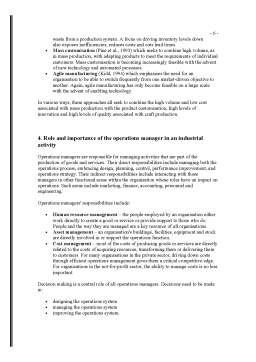Extras din referat
In order to make the best of understanding the concept of Industrial Management, we have to have some solid knowledge from both sides on the complex notion (Economics and Engineering), because one can righteously state that it is a mixture of the two.
There is more than one approach for treating this subject. Consequently, my choice will involve discussing both general and particular aspects of the problem.
1. Management
Be it that we like it or not, we all live in a so-called consumerist society- an economic, social and industrial infrastructure based on an equation of personal happiness with the purchase of material possessions and consumption.
For a relatively healthy balance to be established between all these factors, all individuals must bring a contribution to it.
In fact, this is exactly what Management deals with; it is merely the act of getting people together in business and human organization activity to accomplish desired goals. Management comprises planning, organizing, staffing, leading or directing, and controlling an organization (a group of one or more people or entities) or effort for the purpose of accomplishing a goal.
Resourcing encompasses the deployment and manipulation of human resources, financial resources, technological resources, and natural resources.
Management is considered to be "the art of getting things done through people". One can also think of management functionally, as the action of measuring a quantity on a regular basis and of adjusting some initial plan; or as the actions taken to reach one's intended goal.
Towards the end of the 20th century, business management came to consist of six separate branches, namely:
• Human resource management
• Operations management or production management
• Strategic management
• Marketing management
• Financial management
• Information technology management responsible for management information systems
In for-profit work, management has as its primary function the satisfaction of a range of stakeholders. This typically involves making a profit (for the shareholders), creating valued products at a reasonable cost (for customers), and providing rewarding employment opportunities (for employees).
Management operates through various functions, often classified as planning, organizing, leading/motivating, and controlling.
• Planning: Deciding what needs to happen in the future (today, next week, next month, next year, over the next 5 years, etc.) and generating plans for action.
• Organizing: (Implementation) making optimum use of the resources required to enable the successful carrying out of plans.
• Staffing: Job Analyzing, recruitment, and hiring individuals for appropriate jobs.
• Leading/Motivating: Exhibiting leadership and motivational skills in order to encourage others to play an effective part in achieving plans and ensure willing participation in the organization on the parts of workers.
• Controlling: Monitoring, checking progress against plans, which may need modification based on feedback.
2. Industry and Engineering
Industry represents the manufacturing of a good or service within a category.
Although industry is a broad term for any kind of economic production, in economics and urban planning industry is a synonym for the secondary sector, which is a type of economic activity involved in the manufacturing of raw materials into goods and products.
There are four key industrial economic sectors: the primary sector, largely raw material extraction industries such as mining and farming; the secondary sector, involving refining and manufacturing; the tertiary sector, which deals with services (such as law and medicine) and distribution of manufactured goods; and the quaternary sector, a relatively new type of knowledge industry focusing on technological research, design and development such as computer programming, and biochemistry. A fifth sector has been proposed encompassing nonprofit activities. The economy is also broadly separated into public sector and private sector, with industry generally categorized as private.
The people that deal with and to much extent determine the constant development of Industry are the engineers.
Preview document
Conținut arhivă zip
- Importance of Industrial Management.doc





















